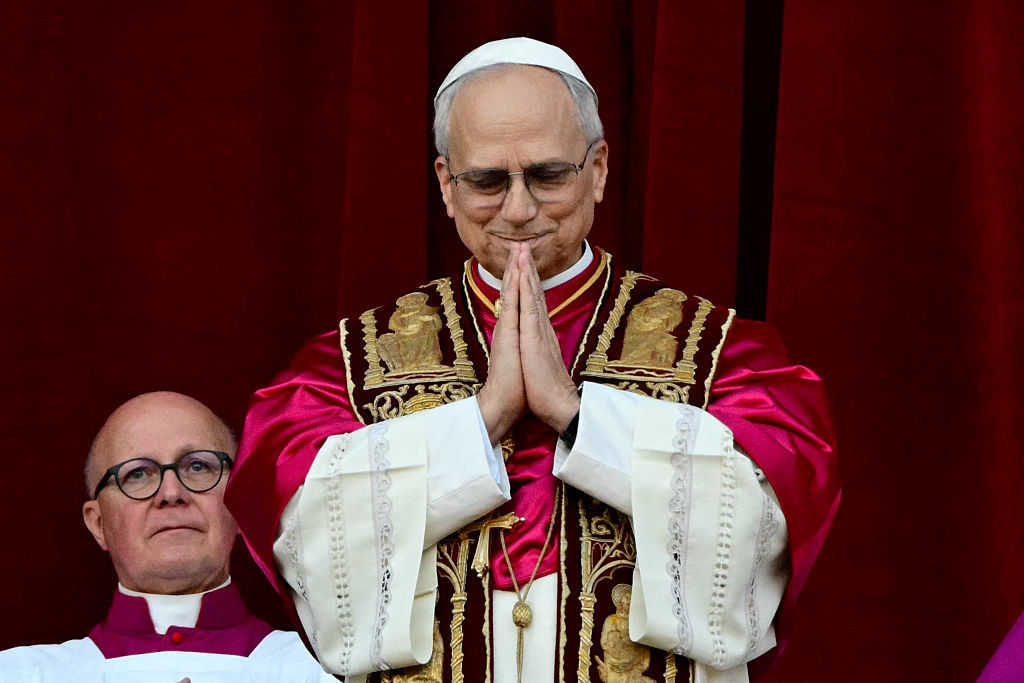No one loves their city quite like Chicagoans do, with a swaggering loyalty that blurs civic pride into something closer to religious conviction, a hometown devotion that doubles as a perfectly seared side-eye to the coasts. That said, we don’t take ourselves too seriously — something that’s palpable, even to outsiders. Anthony Bourdain, a dyed-in-the-wool New Yorker with a keen eye for the soul of a place, once called Chicago one of America’s last great “no bulls**t zones,” a place where “pomposity, pretentiousness, putting on airs of any kind, douchery and lack of a sense of humor will not get you far.”
So perhaps it’s no surprise that when the news broke of the election of Robert Prevost as Pope Leo XIV — the first American pope, born and raised in Chicago — the city responded first with reverence, then with a flood of food jokes. That is, after the “Blues Brothers” bits cleared the airspace. (He is a man on a mission from God, after all.)
Within hours of the white smoke billowing from the Sistine Chapel chimney, someone had photoshopped the Vatican façade to look like a Portillo’s. Another declared that the new holy water was Malört. And when I texted my far more devout brother to ask what he thought, he replied instantly: “This is a man who has eaten a hot dog. This is a man who has had deep dish pizza.”
It’s easy to laugh — because it is funny and Chicago’s sense of humor doubles as civic armor — but there’s also something more meaningful happening under the surface. In an institution known for its centuries-old rituals and grandiose hierarchy, here was something that felt unexpectedly close. Here was a man whose tastes have ostensibly been shaped by the same baseball game concessions and neighborhood pizza joints that anyone else in the city has frequented (though apparently he did have a soft spot for both The White Sox and Aurelio’s tavern-style, thin-crust). That’s rare for a figure as lofty as the pope, whose leadership is often more about theological discourse and institutional power than personal relatability.
Yet food, in its intimacy and ubiquity, has the power to break down that wall. It offers us a way in, an access point we all recognize.
Food has always served as the great equalizer between power and the people. It’s why every election cycle, without fail, politicians stage grand, faux-humble stunts, where they eat like locals to relate to the very people they’ll never truly know. We’ve all seen it: the awkward photo ops at greasy spoons, the overzealous bites of funnel cakes or chili dogs that slouch precariously on paper plates, the moment when a politician’s hands tremble as they struggle to hold a deep-fried delicacy they’ll never order again. It’s almost always a little cringeworthy, but it’s also a reminder of food’s power to connect us.
We need your help to stay independent
For most of us, the political figures who wield the most influence over our lives might as well be on another planet. But when a candidate steps off the campaign bus in a pair of jeans and orders a hot dog with all the fixings, they’re doing more than just eating. They’re trying to do what food does so effortlessly: humanize themselves.
And in a city where food is so often the language of identity, politics, grief and joy, it makes a kind of cosmic sense that the first American pope would be greeted not with total solemnity, but with a Vienna beef and a shot of Malört. These aren’t just jokes; they’re a way of saying: He’s one of us.
While drafting this story, an email pinged into my inbox like divine timing. Portillo’s — yes, that Portillo’s—was launching a limited-time menu item in honor of the new pontiff.
“In the name of the gravy, the bun, and the hot giard, we introduce The Leo: a divinely seasoned Italian beef, baptized in gravy and finished with the holy trinity of peppers — sweet, hot, or a combo,” the press release read. It went on to call the sandwich “bold, unapologetically flavorful,” and “made in honor of a moment that’s historic for Portillo’s hometown.” I couldn’t stop laughing. Not because it was a little ridiculous, but because it was perfect.
Only in Chicago could the rise of a new pope double as a marketing opportunity for Italian beef. Only in Chicago would that not feel cheap, but true.
Because when power feels far away, food brings it back to the table.
Read more
about this topic


